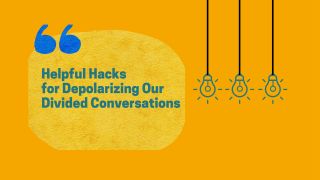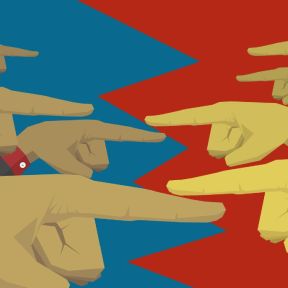BIAS- 5 Helpful Hacks for Depolarizing Our Divided Conversations. It’s not about winning arguments, it’s about using scientific thinking. Reviewed by Tyler Woods

KEY POINTS-
- Culture wars call attention to conflicts in values and our frustrating, emotionally charged conversations.
- To date, most solutions to this problem have relied on a conventional approach.
- By contrast, the solution we devised is a systematic meta-method that changes our thinking.
Culture wars have been a staple of American politics and have polarized the United States for decades.
The 1960’s brought a new wave of the progressive movement to advance civil rights, which gained momentum as these divided debates carried on throughout the 1980’s and 1990’s.

Public battles over race, sexuality, gender, religion, and even popular art and music began to divide our nation, and progressive policies that pushed for change were slowly integrated with our laws and norms.
In times when these culture wars were at their highest peaks, we struggled as a nation to define our collective identity in the wake of changing demographics, and a progressive movement met conservative opposition. These divisions seemed to fade over the turn of the century, to the point that some scholars maintained that the culture wars were over and the metaphor ran its course (Hartman, 2016, p. 285).
This prediction may have seemed logical at the time, but as American politics and culture progressed, it became clear that the culture wars were not exhausted. Studies have found that Americans were more divided than ever and that this polarization has ignited a crisis of legitimacy among those dissatisfied with the government, the media, and higher education. As new people and perspectives were welcomed into "elite institutions," latent racial and sexual tensions became staunch opposition to "political correctness" (Hunter & Bowman, 2016; Pew Research Center, 2020).

These underlying tensions were met with the rise of "cancel culture," which has heightened our sensitivities to conflict and lowered our steadfastness to engaging in polarizing conversations with any hope of progress. Immigration, feminism, abortion, reparations, gay rights, gun control, border management, school curricula, religious issues, racial issues, defunding the police, mandatory vaccinations, race, and diversity, among others, have become such controversial topics that, at times, we are left flabbergasted and wondering how to have conversations with a person who has transformed into an opponent right before our eyes.
The current state of culture wars calls attention to our conflicts in values and highlights how emotionally charged people have become in their beliefs and world views. Because these are interlaced with our identities, histories, attachments, and need to belong, any opposition may be an immediate threat, causing us to go into fight-or-flight mode to protect our sense of self (Weissmark, 2020).
Because of these emotional brain activations, it is no surprise that when we choose to engage, we often find ourselves protective, frustrated, defensive, and closed-minded as we fight tooth and nail to defeat our "opponent." As our biological responses alert us to real or imagined ego identity threats, we find ourselves beholden to our most basic instinct of self-preservation, where loyalty and alignment to our identities result in a self-perpetuating logic that makes open-minded, collaborative conversations nearly impossible.
These complex, engrained layers of identity, guided by our basic survival instinct, leave us wondering: Are there solutions to this conundrum?
The quick answer is yes.
To date, however, most solutions to this problem have relied on a conventional approach, such as giving advice and telling people what to say during difficult conversations, such as "I want to understand your perspective," or, "Ask the person you disagree with how their views have evolved," or, "Imagine what it's like living in another person's life.”
By contrast, the solution we have devised is a systematic meta-method that changes one's thinking and allows us to overcome our fight-or-flight emotions to understand the psychological intricacies of other perspectives on polarizing issues. The Science of Diversity Educational Method® treats approaching emotionally charged topics in a way that engages minds through a series of steps that first recognize these emotions and then take us through a series of collaborative processes to evaluate our perspectives and reflect on how emotions may have pushed us to choose a "side" that "feels" as though it is the only position any logical person could take.
When teaching the Psychology of Diversity courses at Harvard and consulting with companies, where conversations on hot-button topics can quickly turn to heated debates, we set the stage to encourage scientific thinking with five simple hacks:
Helpful Hacks for Depolarizing Conversations Using Scientific Thinking
- We ask people to formulate hypotheses collaboratively. People usually start by basing their hypothesis on a belief or personal experiences. This exercise encourages them to practice thinking about their beliefs and views as a hypothesis to be tested.
- We then asks people to formulate a null hypothesis and an alternative (research) hypothesis. The null hypothesis states that two variables (e.g., race and police brutality, immigration and the economy) have no relationship. The research hypothesis states there is a relationship between two variables and often predicts the type of effect one will have on the other. Here, the independent variable (e.g., race) affects the dependent variable (e.g., the likelihood of police brutality). For example, one person might hypothesize that African-Americans are more likely to be subjected to police brutality. Another person might formulate the null hypothesis—that there is no relationship between these two variables, and think brutality is related to an independent variable other than race. Additionally, another person might hypothesize that African-Americans are less likely to be subjected to police brutality. The logic of the null hypothesis is this: If we can reject the null hypothesis as incorrect, then we accept the research hypothesis as correct. Acceptance of the research hypothesis means that the independent variable had an effect on the dependent variable.
- Next, we ask everyone to work together to research peer-reviewed literature to find out what the data says about the relationship between race and police brutality. We ask them to consider what other factors contribute to the nexus between the two.
- Then, everyone is tasked with finding peer-reviewed scientific journal articles with conflicting findings. When people are encouraged to seek out information in support of each side, they are encouraged to seek out information without a fixed belief. This allows them to problem-solve together by asking, "Why do these studies come to opposite conclusions? What data collection and analysis approaches were used? What other factors could play a role in the discrepancy?"
- Finally, everyone is tasked with finding meta-analytic studies that summarize the conflicting studies, which are important because they take a collection of different scientific findings and evaluate them based on the approach and data.
From there, we work together to read all of the information from each article, analyze the differences in how they were formulated, and discuss the strengths and weaknesses of each. In this way, scientific thinking acts as a springboard to opening up conversations and moving forward. We can then ask more complex questions, such as, "What effect does taking race out of the conversation on police brutality have on a person who has experienced racism? What effect does placing race as the central cause of police brutality have on a person who has experienced such brutality without race being a factor?"
"Scientific thinking" refers to a process of thought based on integrating previous knowledge and examining all the data. This steers us away from trying to prove a particular point and cherry-picking facts without providing context. Unlike conventional binary thinking, the Science of Diversity Educational Method uses non-binary consideration by checking our preconceived categorizations and finding more flexible and nuanced ways of ordering reality that can reveal cracks in what we thought was impenetrable logic in support of our position.
In this approach, we must initially consider the null and research hypothesis to be both false and true. We must be open-minded to the possibility of rejecting or accepting the null hypothesis and sometimes acknowledge that more than one hypothesis can be true or false simultaneously. The purpose of the null and research hypothesis is to test whether the empirical data support an idea, regardless of our initial beliefs.
It is the willingness to unlearn and relearn through a continuing open-ended process of systematically deepening our understanding of an issue that makes scientific thinking such a valuable tool for engagement and moves these difficult conversations forward.
- Questions and Answers
- Opinion
- Motivational and Inspiring Story
- Technology
- Live and Let live
- Focus
- Geopolitics
- Military-Arms/Equipment
- Sécurité
- Economy
- Beasts of Nations
- Machine Tools-The “Mother Industry”
- Art
- Causes
- Crafts
- Dance
- Drinks
- Film/Movie
- Fitness
- Food
- Jeux
- Gardening
- Health
- Domicile
- Literature
- Music
- Networking
- Autre
- Party
- Religion
- Shopping
- Sports
- Theater
- Health and Wellness
- News
- Culture

